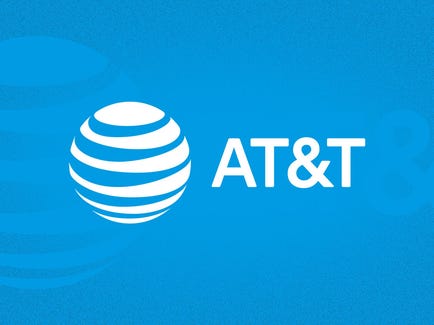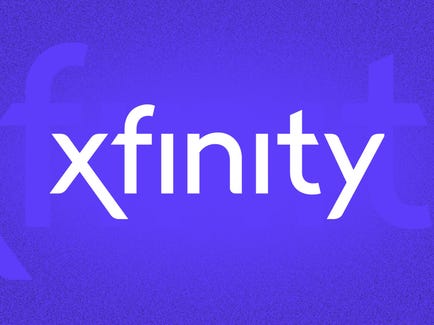AT&T vs. Xfinity: Customer-Friendly Fiber and Low-Cost Cable
Xfinity is the go to for cheap internet, but AT&T Fiber often proves to be the better overall value. Here's how the two top ISPs compare.


Is AT&T or Xfinity internet better?
A case could be made for either provider as the best overall, but given the choice of AT&T Fiber or Xfinity, I would recommend AT&T Fiber. Xfinity has a larger coverage area and lower introductory rates, but AT&T Fiber comes with no data caps, equipment fees, contracts or set price increases. Xfinity, on the other hand, is likely to come with some or all of those conditions depending on where you live and the plan you choose.
AT&T and Xfinity are two of the largest internet service providers in the US, so one or both providers may be available at your address. If that's the case, you'll have a nice selection of high-speed, high-value plans.
The fast speeds, fair pricing, and favorable service terms have earned both providers high customer satisfaction ratings. AT&T and Xfinity finished with above-average ratings among major internet providers in the most recent surveys from the American Customer Satisfaction Index and J.D. Power and Associates.
Locating local internet providers
Which of these two ISPs, AT&T or Xfinity best fits your home networking needs? Let's closely examine how they stack up so you can decide.
AT&T
A frontrunner among fiber internet providers
Our take - AT&T fiber plans are tough to beat: 300Mbps starting at $55 per month, 500Mbps for $65 and gigabit service starting at just $80 monthly. On top of that, over 100 AT&T cities nationwide are eligible for the company's fastest fiber plans: 2Gbps for $125 and 5Gbps for $225.
Xfinity
A top choice for cable internet
Our take - Xfinity offers more plan options than AT&T and is likely to have the cheapest plan, though speeds with the said plan will be much lower than the lowest-priced AT&T Fiber plan. Just watch out for a price increase after your promotional period of one or two years -- it could add as much as $20 to $50 to your bill, depending on where you live and the plan you choose.
AT&T vs. Xfinity plans, pricing and speeds
You'll find an overview of AT&T Fiber and Xfinity internet plans below. Available Xfinity speeds, pricing and service terms can and do vary by region and the specific plan you choose. I only included plan details for AT&T Fiber because if your choice comes down to Xfinity and AT&T's DSL or fixed wireless service, you should go with Xfinity.
Locating local internet providers
AT&T Fiber plans
|
AT&T Fiber plan Read full review | Starting monthly price | Max download speeds | Max upload speeds | Equipment fee | Data cap | Contract |
|---|---|---|---|---|---|---|
| Fiber 300 | $55 | 300Mbps | 300Mbps | None | None | None |
| Fiber 500 | $65 | 500Mbps | 500Mbps | None | None | None |
| Fiber Gig | $80 | 1,000Mbps | 1,000Mbps | None | None | None |
| Fiber 2 Gig | $125 | 2,000Mbps | 2,000Mbps | None | None | None |
| Fiber 5 Gig | $225 | 5,000Mbps | 5,000Mbps | None | None | None |
Xfinity internet plans
|
Xfinity plan Read full review | Starting monthly price | Max download speeds | Max upload speeds | Equipment fee | Data cap | Contract |
|---|---|---|---|---|---|---|
| Connect | $20 | 150Mbps | 10Mbps | $15 (optional) | 1.25TB | 1-2 years (optional) |
| Connect More | $35 | 300Mbps | 10Mbps | $15 (optional) | 1.25TB | 1-2 years (optional) |
| Fast | $55 | 500Mbps | 15Mbps | $15 (optional) | 1.25TB | 1-2 years (optional) |
| Superfast | $70 | 800Mbps | 15Mbps | $15 (optional) | 1.25TB | 1-2 years (optional) |
| Gigabit | $80 | 1,000Mbps | 35Mbps | $15 (optional) | 1.25TB | 1-2 years (optional) |
| Gigabit Extra | $85 | 1,200Mbps | 35Mbps | $15 (optional) | 1.25TB | 1-2 years (optional) |
| Gigabit x2 | $100 | 2,000Mbps | 200Mbps | $15 (optional) | None | 1-2 years (optional) |
Xfinity's speed tiers are fairly consistent throughout all service areas, but pricing may vary slightly from one market to the next. For example, the standard speed for Xfinity Connect is 150Mbps, but the starting price can vary anywhere from $20 to $30 per month based on where you live.
Rates on all plans, excluding the $300-per-month 10 gigabit plan, are set to increase after the first year or two of service, depending on your location and the plan you choose. The exact increase will, again, vary by location and the plan you choose, but it's possible your monthly bill could go up by $20 to $50 or more once the price guarantee expires. Service terms also vary by location and plan as a data cap, equipment fee (if you choose to rent) and contract may apply.
Meanwhile, AT&T Fiber plans, speeds and terms are consistent regardless of what part of the country you live in. The provider's 300, 500 and 1,000Mbps plans are available in all service areas while many will also have the choice of 2,000 and 5,000Mbps plans as well. There is no set price increase after 12 months.
AT&T plans don't come with service contracts, but your bill will go up after the promo period if you have DSL or fixed wireless. None of the plans will jump by more than $15, though, so the increase isn't as steep as you might see with Xfinity.
Fees, data caps and other potential sticking points
Both providers may tack on taxes and monthly fees each month, and in some cases, you'll also need to manage a data cap.
AT&T vs. Xfinity added fees
First, the fees. Like most providers, AT&T and Xfinity will charge you a bit extra each month if you don't enroll in autopay or paperless billing, but those fees are easy enough to dodge. Just, you know, enroll in autopay and paperless billing. Problem solved.
You'll need to add $14 per month to your Comcast bill to use its xFi Gateway -- but you can skip that fee by using your own modem and router.
The equipment fees are another story. With AT&T, you won't need to pay extra to use AT&T's Wi-Fi gateway. That's included in the regular monthly fee. With Comcast Xfinity, the cost to rent the xFi Gateway is $15 per month, but it may be included at no extra charge with your plan. You can also bypass the fee, if there is one, by using your own equipment, provided it's approved to work with Xfinity, and you're OK with the fact that Comcast will no longer be able to offer device-specific technical support.
AT&T vs. Xfinity data caps
As for data caps, AT&T doesn't use them with any of its fiber plans, so we'll give it some credit. There is, however, a data cap for AT&T's nonfiber plans, which is why we said just a little bit of credit.
AT&T Internet, the DSL side of the service, comes with a data cap of terabyte and a half of data (1.5TB) in a given month of service. You'll get charged $10 for every additional 50GB of data your home uses. That additional charge gets capped at $100, so once you've eaten up at least 500GB of extra data, AT&T throws its hands up and says, "see you next month." If you think you need unlimited data, you can upgrade your plan for an extra $30 per month to sidestep the data cap altogether, and you can also ditch the data cap by bundling home internet with other AT&T services.
Another point of note: The data cap with AT&T Fixed Wireless is much lower, kicking in at 300GB. You'll still get charged $10 for each additional 50GB of data you use, but AT&T caps the charge at $200 instead of $100. Be mindful of falling asleep during a Netflix binge, AT&T Fixed Wireless customers.
Xfinity, meanwhile, enforces a data cap of 1.25TB per month, but some locations and plans may have no data cap at all. If you have a cap, going over may cost you $10 for every 50GB of excess data used, capped at $100.
In fairness, 1.25TB is a lot of data, but it's not unreasonable to think that a busy household would occasionally need more. For example, on my network, where I work from home, stream plenty of movies in 4K, and live with a roommate who's online just as much as I am, we went through about 320GB of data here in the first nine days of the month. That put us on pace to use just over 1TB by the end of the month.
If you live with, say, two roommates -- or with a whole family of internet users -- then data caps like those might be something you'd want to steer clear of if you could.
AT&T vs. Xfinity contracts
AT&T internet service, from fiber to fixed wireless, does not require a contract. Xfinity also does not make you sign a contract, but select plans may require a one- or two-year term agreement in order to get the lowest pricing. Canceling or changing your service before the term agreement is up may result in early termination fees and losing the lower introductory rate on service.
AT&T vs. Xfinity installation costs
AT&T charges $99 for professional, in-home installation, but self-installation kits are available in some cases, too. Check with the company to see if that's an option for you. If not, asking the salesperson if they'll waive the installation fee is probably worth the attempt, as AT&T often waives it during seasonal promos.
With Xfinity, professional installation costs less at $40, and you don't have to "qualify" for the self-installation option like you do with AT&T. Point Comcast.
AT&T vs. Xfinity coverage compared
AT&T's networks (copper in pink, fiber in purple) and Xfinity's cable internet service (green) share coverage areas in the South, Midwest and parts of California.
A product of the nation's largest cable provider, Xfinity Internet, is available in select regions across 39 states and Washington, DC, covering about one-third of the entire population of the US. Most of that coverage is cable internet, but Xfinity has a small fiber network.
Areas where Xfinity's fiber internet service is available primarily include parts Indiana, Illinois and Michigan, though parts of Florida, Georgia and Tennessee may be serviceable for fiber as well.
As for AT&T, the telecom company offers home internet plans in 21 states, covering much of the South, Midwest, and West Coast. Both providers may be available at your address in some parts of the country, including Atlanta, Chicago, Detroit, Houston, Memphis, Miami and San Francisco.
AT&T pegs the number of households with access to fiber at approximately 21 million, spanning over 100 metro areas. The company plans to expand fiber access to millions more homes by the end of 2025, including the rollout of its multigigabit plans.
For the rest, there's AT&T Internet Air and AT&T Fixed Wireless, which use a satellite mounted at your home to receive a wireless signal, and AT&T Internet, which uses DSL copper cable connections in combination with the company's fiber infrastructure to deliver service to people's homes, albeit it at much slower speeds.
AT&T vs. Xfinity customer satisfaction scores
AT&T and Comcast Xfinity both do well for customer satisfaction among internet providers.
Everyone loves to hate their internet provider, so it's no surprise that customer satisfaction scores for the ISP industry aren't anything impressive. Still, AT&T and Comcast Xfinity are relatively strong performers here. Each finished with an above-average score from the American Customer Satisfaction Index in 2023, good enough to place both among the top four of all ISPs surveyed.
Meanwhile, AT&T grabbed the top spot in the North-Central and West regions, and second in the South (where Google Fiber scored highest) in the most recent J.D. Power US Residential Internet Service Provider Satisfaction Study for 2023. Xfinity customer satisfaction was below AT&T in each of those three regions, but still comfortably above the regional averages.
AT&T vs. Xfinity recap
If your options are AT&T Internet (the copper-based, DSL-related service) or AT&T's fixed wireless service and Xfinity, the latter will be the best choice for speed, value, reliability, etc., nearly every time. On the other hand, if your address is serviceable for AT&T Fiber and Xfinity, you're likely to get a better value with more favorable service terms from AT&T Fiber than Xfinity. Given the choice of the two, Xfinity stands out for its broad availability and low introductory pricing, but AT&T Fiber has the advantage in virtually every other category.
AT&T vs. Xfinity FAQs
Which is better, AT&T or Xfinity?
It depends on how you judge "better." Xfinity has the fastest plan between the two (the Gigabit Pro plan at 10,000Mbps), but at $300 per month, it's also the most expensive. AT&T has a 5,000Mbps plan that's a bit cheaper at $225 a month. We might lean towards AT&T because of its fiber internet plans, but those are not available to all customers within its footprint. Others might have to settle for DSL. In those cases, Xfinity and its cable internet plans would be preferable.
Is Xfinity cheaper than AT&T?
Among their regular offerings, Xfinity's cheapest plan, depending on where you live, ranges from $20-$30 per month, while AT&T Fiber's cheapest tier starts at $55 monthly. However, both providers also offer discounted plans for low-income households. Access from AT&T features a 100Mbps plan for $30 per month, while Xfinity has Internet Essentials, a 50Mbps plan for $10 a month.
Can you get fiber internet service from AT&T or Xfinity?
Yes. AT&T's fiber internet offerings are more widely available. Per the FCC's latest information, AT&T provides fiber internet to about a third of its customers. Meanwhile, Xfinity is mostly a hybrid of cable and fiber, though its Gigabit Pro tier is a 100% fiber connection.
Home Internet Guides
- Sometimes a provider is available in your Zip code, but not at your exact address
- See what exact plans are available at your home




